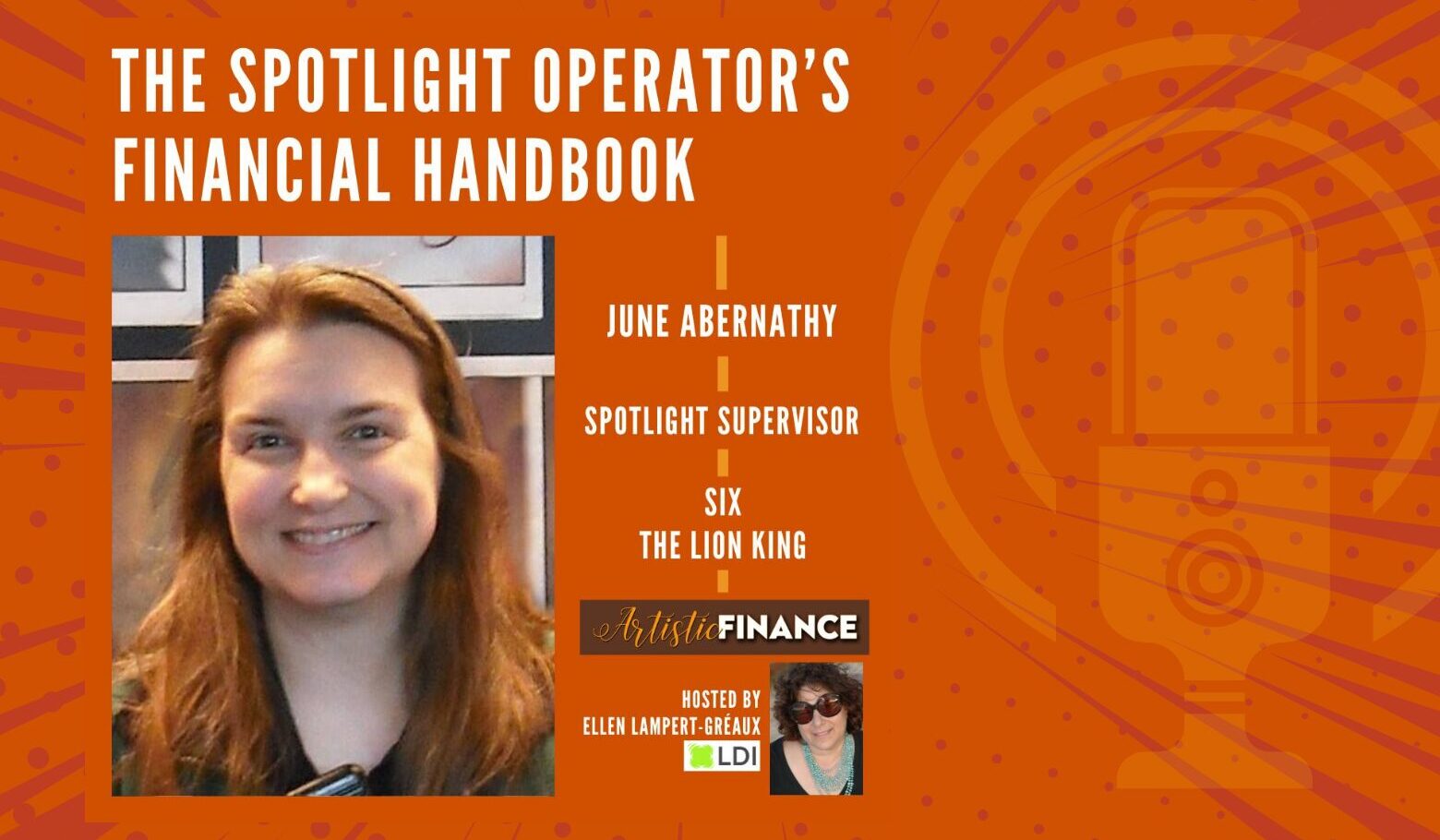June Abernathy: Spotlight, Side Hustles, and Saving

In this bonus episode of Artistic Finance, spotlight supervisor and author June Abernathy shares practical financial advice tailored for touring professionals and freelancers. From saving 10% and paying yourself first to navigating credit cards, union rates, and tax pitfalls on the road, June delivers candid insights every creative should hear. Below is an insight into some of the topics covered in this Podcast.
How did June Abernathy become a go-to expert in spotlight operation?
I started in college as a stage manager but took backstage crew work for extra income. Over time, I got deeper into lighting and joined IATSE. Being a spotlight supervisor on tour requires two key skills: knowing how to operate a spotlight and being able to call cues. Since I had both, I got more gigs. There’s little formal training in spotlight operation anymore, so I wrote The Spotlight Operator’s Handbook to fill that gap and reduce the time I spent training new operators on the job.
What are June’s core financial principles for freelancers?
My mom had to take over the family finances when my dad had a stroke, and she made sure we learned too. Her favorite book was The Wealthy Barber, which taught me two key rules: save 10% of everything you earn and pay yourself first. Don’t wait to see what’s left to save—there’s never “extra.” Set aside that 10% off the top. I’ve lived by that. Also, retirement isn’t a luxury—it’s a necessity, especially in our industry where many work without traditional benefits.
How should creatives approach pricing their services and understanding their market value?
Unions like IATSE and Actors’ Equity are useful because they provide standard rates for different jobs. Even if you’re freelance, those rates give you a baseline. Too many people base their fees on what they need, but clients base offers on what they’re willing to pay. Neither is ideal. You need to know the going rate for that type of job. Do the math: figure out what you need weekly, monthly, annually, and break it down so you know your bottom line. Talk to peers, use Glassdoor, and be transparent. Networking helps uncover real rates.
What tools and strategies does June use to manage finances as a touring freelancer?
I use Quicken to categorize expenses, especially for taxes. I track by deductible categories—tools, costumes, travel, etc.—so I can hand my accountant clean reports. Touring has quirks too. For example, if you don’t maintain a permanent residence, your per diem can be taxed. A PO box doesn’t count. You need a paper trail—bills, rent—to prove you have a home base. Also, diversification saved me during the pandemic. I’m a stagehand, stage manager, writer, speaker, and educator. Multiple income streams are crucial when live events slow down.
What are June’s thoughts on credit cards, investing, and financial advice from public figures like Dave Ramsey?
The idea that all credit cards are bad is too simplistic. You often need a credit card to rent cars or book hotels on tour. But yes—credit cards can be financial traps. Always set auto-pay for at least the minimum to avoid late fees and interest hikes. As for investing, I treat single stock picking as gambling. Real investing for me means no-load mutual funds and index funds like Vanguard’s. Ramsey’s advice—save 15%, avoid car loans—is solid, but not always built for freelancers. Creative professionals have irregular income and unique needs. You have to adapt traditional advice to our lifestyle.
Key Takeaways from the Episode
Save 10% and pay yourself first—these two rules are the foundation of financial survival for freelancers.
Know the going rate—price your work based on the market, not your personal needs or what a client wants to pay.
Diversify income streams—stage work, teaching, writing, and side gigs provide resilience during industry lulls.
Automate savings and track expenses—tools like Quicken can help make tax season manageable.
Adapt mainstream advice—what works for salaried workers may not apply to freelancers; know what applies and what doesn’t.
Listen to this Episode on:
Website / Spotify / Apple Podcasts / YouTube
This episode of the Artistic Finance podcast is hosted by Ellen Lampert-Gréaux.
Editor's Note: At StageLync, an international platform for the performing arts, we celebrate the diversity of our writers' backgrounds. We recognize and support their choice to use either American or British English in their articles, respecting their individual preferences and origins. This policy allows us to embrace a wide range of linguistic expressions, enriching our content and reflecting the global nature of our community.
🎧 Join us on the StageLync Podcast for inspiring stories from the world of performing arts! Tune in to hear from the creative minds who bring magic to life, both onstage and behind the scenes. 🎙️ 👉 Listen now!
